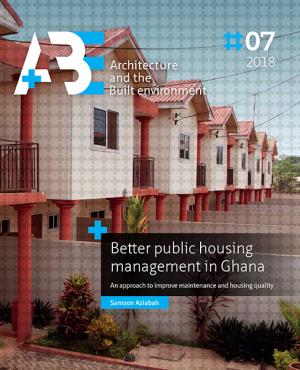Hosted by
Better public housing management in Ghana: An approach to improve maintenance and housing quality
Synopsis
Adequate housing and shelter have been recognised by the United Nations (UN) as a human right. All signatory countries to the Universal Declaration on Human Rights are enjoined to take steps to provide decent and adequate housing to their people. To this end, the UN has led and advocated various policy initiatives aimed at addressing housing challenges globally. In the 1950s, it advocated direct housing production by member states. Since the 1970s, it has advocated the enablement approach, encouraging governments to create the enabling environment for the private sector to provide housing. Ghana’s housing policy has changed largely in line with global trends. In the 1950s, the State Housing Corporation (SHC) and the Tema Development Corporation (TDC) were established to lead governmental direct housing provision. However, in the late 1970s and 1980s, when national housing policy shifted towards the enablement approach, most (more than 90%) of public housing was sold to sitting tenants and institutions, and the TDC and SHC were reconstituted into private companies owned by the government. The remainder of the public houses were transferred to local authorities (LAs) to manage. The United Nations has emphasised not only housing production but also maintenance as a sustainable way of meeting the goal of decent and adequate housing. From this point of view, it is possible to reflect on that aspect of public housing managed by local authorities in Ghana. Several researches and commentaries about Ghana’s public housing have highlighted the poor and deteriorating quality, largely due to lack of maintenance. They make reference to leaking roofs, rotten ceilings, cracked walls, faded paint, and dysfunctional electrical and plumbing systems, among other problems in public housing. However, not much research has focused on how to address the problem of lack of maintenance. It is within this context that this PhD research has sought to extend the discussion and contribute practical steps to address the problem of lack of maintenance in public housing.
Therefore, the aim of this PhD research was to propose an approach to public housing management (HM) by LAs that may bring about maintenance and lead to better housing quality in Ghana. To do that, four research questions were addressed. (1) How is housing management by LAs organised, and how have challenges therein affected the quality of public housing? (2) What factors can be distinguished to describe the organisation of and assess performance in HM? (3) What lessons can be learned from the organisation and practice of HM in other contexts? and (4) How can the lessons learned from other contexts be applied to housing by local authorities in order to bring about maintenance that may lead to improvement in public housing quality in Ghana? A pragmatic approach was adopted for this research, within which case studies, lesson drawing, and transferability strategies were applied.
The methods of data collection and analyses were largely qualitative, with minimal application of quantitative techniques.
The research combined the organisational elements of policy/strategy, legal framework, organisational structure, financial resources, human resources, culture, and housing quality; the categorisation of HM activities into technical, social, and financial; and external context factors, which may include regulatory and policy environment and cultural factors that affect HM, into a framework to analyse the organisation and management of housing. Also, the research found that, in general, performance in HM may be assessed by using indicators such as: quality of maintenance, responses from staff in relation to tenant services, and access to information by tenants, which measure effectiveness; cost of maintenance per dwelling and net rent as measures of efficiency and economy; application procedures, rent levels, and support for tenants as measures of equity; and the level of participation and the frequency and ease of communication with tenants as measures of legitimacy and support for HM. However, the research relied on information about effectiveness — maintenance and repairs, tenant services, and legitimacy and support — tenant participation, to comment on the performance of HM.
The research first sought to understand the challenges of public HM and maintenance by local authorities. It found that, among others, public HM confronts the following key challenges: There is no clearly defined institutional structure for HM. There is no coordination of roles performed by the housing officer of the central administration of the local authority, the works department, and tenants. Also, there is no coordination between local authorities that are responsible for management and the central government agency that collects rents, the Controller and Accountant Generals Department (CAGD). Furthermore, local authorities lack funds necessary for maintenance because rents are largely collected by central government and not transferred to them. Additionally, inadequate numbers of professionals are available to manage and maintain public houses.
Informed by the problems of public HM in Ghana, two models of HM were selected and studied to draw lessons for solving the problems in Ghana. The purpose of the studies was to abstract principles from the organisation and practice of HM by identifying issues that need to be addressed for effective housing management and maintenance. Housing management by housing associations (HAs) in the Netherlands and council housing management by tenant management organisations (TMOs) in England were studied. HAs are independent not-for-profit professional housing associations that provide housing mainly for low- and middle-income households in the Netherlands. Wonen Wateringen (WW) housing association was studied in this model. The main principles abstracted from this model were that regulatory and policy guidance are in place, mechanisms to monitor and supervise HM are in place, there is financial security for HM, rents are able to cover housing management and maintenance, there are a defined structure and operational procedures and responsibilities, professionals manage housing, and mechanisms for tenants to participate are in place.
TMOs are tenant organisations formed to take on the responsibility of providing some HM services of local councils or HAs in England. Common services that TMOs take on include repairs and maintenance (mainly day-to-day complaints repairs and void maintenance), cleaning, caretaking, tenancy management, estate services, and other non-housing services, such as skills training and finance support services. Roman Way Estate Community Interest Company (RWECIC) and Bloomsbury Estate Management Board (BEMB) in Birmingham, England, were studied in this model. The main principles abstracted from this model include: laws, regulations, and codes in place to guide HM; secure finance for housing management; rents that are able to cover housing services; a defined structure and responsibilities of stakeholders; defined mechanisms for supervision and monitoring; professionals carrying out HM; defined protocols to address repairs and maintenance; defined maintenance responsibilities of tenants and managers; and mechanisms to involve tenants.
These principles were then applied as guides to formulate solutions that address the challenges identified in Ghana and presented as a preliminary HM approach. The preliminary approach was further developed through an iterative validation and review process with tenants and local-authority housing professionals in Ghana to produce a final HM approach. By proposing this approach to be implemented by LAs so as to bring about maintenance and lead to improvement in public housing quality, the goal of the research is attained. The HM approach highlights and recommends a defined structure to manage public houses. The actors in the structure include the district assembly, the coordinating director, the housing unit, the works department, and tenants, whose roles, responsibilities, and relationships are clearly defined. Further, the structure outlines a defined protocol for addressing repairs and maintenance, which includes a mechanism to receive and promptly respond to repair requests from tenants. Another key recommendation of the approach is for local authorities to take full responsibility for rents determination and collection, in order to ensure reliable and secure finance for HM. Rents should be determined by reference to house properties and condition, and rents should be collected through direct bank debit into a rent account of the district. Mechanisms such as planning, budgeting, and submission of annual accounts of receipts and expenditure are suggested to ensure that rents are spent on maintenance and adequately accounted for. Furthermore, the approach recommends active tenant participation in management through mechanisms such as regular meetings or tenant representatives. In addition, LA communication with tenants should be enhanced by creating opportunities for tenants to make contact and present concerns. For instance, it should be possible for tenants to walk in, write, or call the office responsible for managing the houses and get a response. It also recommends that local authorities use professionals to manage the houses. Where possible — for example, considering the stock size and financial situation — LAs should either recruit or train already employed staff to take full responsibility for the management, in order to give adequate attention to the task of housing management and maintenance. Finally, the research found that lack of commitment on the part of public officers and LAs has led to mistrust and lack of cooperation from tenants. Therefore, it recommends and emphasises the importance of commitment on the part of local authorities, tenants, and national government to the implementation of the HM approach. LAs need to fulfil their part of the approach — for example, by spending rents on maintenance — and tenants also need to carry out their obligations, which include performing tenant maintenance. National government should be committed and grant permission to determine and collect rents to LAs.
The conclusions reached in this research were made under certain limiting conditions. First, it is acknowledged that there could be flaws in the conclusions and principles abstracted from English and Dutch cases because the research may not have obtained a complete view of the models. This potential arises because it was not possible to interview all stakeholders within the limited time of this PhD research. There may have been flaws in the application of the lessons from these cases to a context as different as Ghana. In the respective instances, the research rigorously conducted interviews and checked with interviewees to ensure that the right lessons were learned, and it adopted an iterative process of validation and review to apply the principles to Ghana. Therefore, it is hoped that the impact of these limitations will be mitigated. Also, the research uses the term “validation” merely to refer to comments on the approach made by housing professionals and tenants in the development of the final approach and not as a surrogate for a practical test.
Notwithstanding the limitations of this PhD research, it has contributed to the efforts of other scholars to highlight the societal problem of lack of maintenance in public housing, and it takes the discussion further by presenting an approach to address the problem. This approach has the potential to impact the wider society, if private and other institutional landlords adapt and apply it in their HM. Also, by implementing this approach, LAs may be able to make a positive impact on other public agencies that are faced with lack of maintenance. In addition, it is hoped that the findings of this research may stimulate individuals, public institutions, and society at large to reflect on the attitude toward, commitment to, and responsibility for public property. From a scientific point of view, it may be said that this PhD research has sought to expand the utility of the analytical framework developed and applied in a Western context (see Gruis, Tsenkova, & Nieboer, 2009) by applying it to the context of a developing country.
It also builds on knowledge of lesson drawing and the transferability of programmes (see Rose, 2001) from one context to another. The thesis recommends applying the HM approach in a participatory research with local authorities in Ghana. Also, further research may be conducted into the phenomena of the commitment and attitudes of people, especially public officers, with a view to bringing about change. Furthermore, researchers may use the approach to lesson drawing and transferability applied in this research in similar researches to advance the development of process steps for effective lesson drawing and transferability from one context to another.

